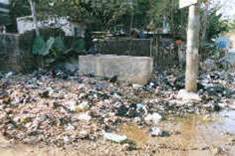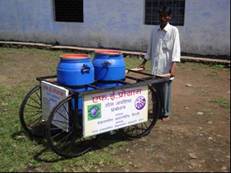The origin of the name
comes from the Hindi word sagar, meaning lake or sea, essentially
a water body. Apparently, because of the large and once beautiful lake,
the town was also named Sagar. The town is over 100 sq km, with a
population of 3,41,000. It is also one of the industrially backward
districts of the state.
Like any other growing town,
Sagar also faces various environmental problems. Approximately 1,70,475
kg (70.5 metric tons) of waste is generated every day from the town. The
local municipality lacks staff for proper collection and disposal of
waste, and is able to dump only 70% of the waste to dumping grounds.
Thus, very often, garbage accumulates along roadsides and bins overflow,
which are not regularly cleared. This waste (mostly organic) putrefies
and is posing serious health problems.
Approach
To tackle this stinking
situation, a local NGO, Rural Environment Development Society (REDS), in
association with Development Alternatives through the CLEAN-India
programme, came forward. The students of CLEAN-India succeeded in
motivating the residents to improve their own environment and were
successful in involving the local people/ residents who generate the
waste.
Innovative System
 The
residents of five colonies of Sagar city adopted a new system of Solid
Waste Management. REDS Sagar initiated the endeavour by adopting five
colonies (Jiyama Puram, Indraprasth Colony, Krishna Vihar Colony,
Dwarika Vihar and State Bank Colony) to carry out the programme on a
pilot basis. These five colonies were identified on the basis of their
willingness to participate in motivating other residents and also to
contribute for the salary of the rag pickers and segregate the waste at
household level. A contribution of Rs 20/- per household is being taken
from all the households to provide for the salary of the two garbage
collectors. The five colonies comprise 121 households and a population
of 631. The NGO partner employed two rag pickers, trained them as waste
collectors, and provided them with uniforms and a pushcart. The cart has
two bins, one for organic and the other for inorganic waste. The waste
collectors collect waste from every household. The residents also took
over the responsibility of ensuring that waste generated from their
households is properly segregated, collected and transported to the
dumpsite of the municipality. The waste thus generated from five
colonies is 515.5 kg (0.5 metric ton), out of which 70% (220 kg) is
biodegradable while the rest is non-biodegradable. The cost of waste
collection has reduced to about 50% as compared to waste collection by
the municipality and efficiency of waste collection is 100% as it
involves people’s participation.
The
residents of five colonies of Sagar city adopted a new system of Solid
Waste Management. REDS Sagar initiated the endeavour by adopting five
colonies (Jiyama Puram, Indraprasth Colony, Krishna Vihar Colony,
Dwarika Vihar and State Bank Colony) to carry out the programme on a
pilot basis. These five colonies were identified on the basis of their
willingness to participate in motivating other residents and also to
contribute for the salary of the rag pickers and segregate the waste at
household level. A contribution of Rs 20/- per household is being taken
from all the households to provide for the salary of the two garbage
collectors. The five colonies comprise 121 households and a population
of 631. The NGO partner employed two rag pickers, trained them as waste
collectors, and provided them with uniforms and a pushcart. The cart has
two bins, one for organic and the other for inorganic waste. The waste
collectors collect waste from every household. The residents also took
over the responsibility of ensuring that waste generated from their
households is properly segregated, collected and transported to the
dumpsite of the municipality. The waste thus generated from five
colonies is 515.5 kg (0.5 metric ton), out of which 70% (220 kg) is
biodegradable while the rest is non-biodegradable. The cost of waste
collection has reduced to about 50% as compared to waste collection by
the municipality and efficiency of waste collection is 100% as it
involves people’s participation.
Scaling up
This enterprise has set an
example for other colonies and now fifteen more colonies have
volunteered to take up a similar waste management system. The initiative
was highly appreciated by Sagar Municipal Corporation. Presently, the
municipal corporation has provided five more pushcarts to CLEAN-India
Sagar, for the expansion of similar activities in newer areas, with the
aim to reap the benefits at the city level.

 The
residents of five colonies of Sagar city adopted a new system of Solid
Waste Management. REDS Sagar initiated the endeavour by adopting five
colonies (Jiyama Puram, Indraprasth Colony, Krishna Vihar Colony,
Dwarika Vihar and State Bank Colony) to carry out the programme on a
pilot basis. These five colonies were identified on the basis of their
willingness to participate in motivating other residents and also to
contribute for the salary of the rag pickers and segregate the waste at
household level. A contribution of Rs 20/- per household is being taken
from all the households to provide for the salary of the two garbage
collectors. The five colonies comprise 121 households and a population
of 631. The NGO partner employed two rag pickers, trained them as waste
collectors, and provided them with uniforms and a pushcart. The cart has
two bins, one for organic and the other for inorganic waste. The waste
collectors collect waste from every household. The residents also took
over the responsibility of ensuring that waste generated from their
households is properly segregated, collected and transported to the
dumpsite of the municipality. The waste thus generated from five
colonies is 515.5 kg (0.5 metric ton), out of which 70% (220 kg) is
biodegradable while the rest is non-biodegradable. The cost of waste
collection has reduced to about 50% as compared to waste collection by
the municipality and efficiency of waste collection is 100% as it
involves people’s participation.
The
residents of five colonies of Sagar city adopted a new system of Solid
Waste Management. REDS Sagar initiated the endeavour by adopting five
colonies (Jiyama Puram, Indraprasth Colony, Krishna Vihar Colony,
Dwarika Vihar and State Bank Colony) to carry out the programme on a
pilot basis. These five colonies were identified on the basis of their
willingness to participate in motivating other residents and also to
contribute for the salary of the rag pickers and segregate the waste at
household level. A contribution of Rs 20/- per household is being taken
from all the households to provide for the salary of the two garbage
collectors. The five colonies comprise 121 households and a population
of 631. The NGO partner employed two rag pickers, trained them as waste
collectors, and provided them with uniforms and a pushcart. The cart has
two bins, one for organic and the other for inorganic waste. The waste
collectors collect waste from every household. The residents also took
over the responsibility of ensuring that waste generated from their
households is properly segregated, collected and transported to the
dumpsite of the municipality. The waste thus generated from five
colonies is 515.5 kg (0.5 metric ton), out of which 70% (220 kg) is
biodegradable while the rest is non-biodegradable. The cost of waste
collection has reduced to about 50% as compared to waste collection by
the municipality and efficiency of waste collection is 100% as it
involves people’s participation.